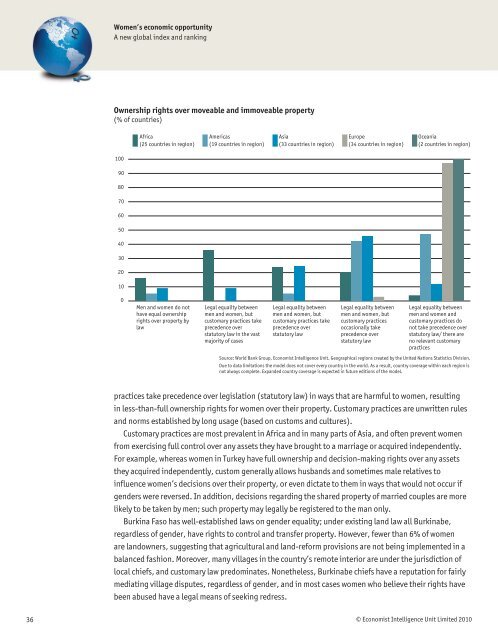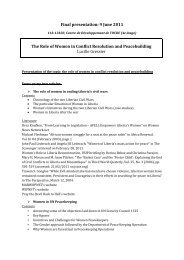Women's Economic Opportunity Index - Economist Intelligence Unit
Women's Economic Opportunity Index - Economist Intelligence Unit
Women's Economic Opportunity Index - Economist Intelligence Unit
- No tags were found...
Create successful ePaper yourself
Turn your PDF publications into a flip-book with our unique Google optimized e-Paper software.
Women’s economic opportunityA new global index and rankingOwnership rights over moveable and immoveable property(% of countries)Africa(25 countries in region)Americas(19 countries in region)Asia(33 countries in region)Europe(34 countries in region)Oceania(2 countries in region)1009080706050403020100Men and women do nothave equal ownershiprights over property bylawLegal equality betweenmen and women, butcustomary practices takeprecedence overstatutory law in the vastmajority of casesLegal equality betweenmen and women, butcustomary practices takeprecedence overstatutory lawLegal equality betweenmen and women, butcustomary practicesoccasionally takeprecedence overstatutory lawLegal equality betweenmen and women andcustomary practices donot take precedence overstatutory law/ there areno relevant customarypracticesSource: World Bank Group, <strong>Economist</strong> <strong>Intelligence</strong> <strong>Unit</strong>. Geographical regions created by the <strong>Unit</strong>ed Nations Statistics Division.Due to data limitations the model does not cover every country in the world. As a result, country coverage within each region isnot always complete. Expanded country coverage is expected in future editions of the model.practices take precedence over legislation (statutory law) in ways that are harmful to women, resultingin less-than-full ownership rights for women over their property. Customary practices are unwritten rulesand norms established by long usage (based on customs and cultures).Customary practices are most prevalent in Africa and in many parts of Asia, and often prevent womenfrom exercising full control over any assets they have brought to a marriage or acquired independently.For example, whereas women in Turkey have full ownership and decision-making rights over any assetsthey acquired independently, custom generally allows husbands and sometimes male relatives toinfluence women’s decisions over their property, or even dictate to them in ways that would not occur ifgenders were reversed. In addition, decisions regarding the shared property of married couples are morelikely to be taken by men; such property may legally be registered to the man only.Burkina Faso has well-established laws on gender equality; under existing land law all Burkinabe,regardless of gender, have rights to control and transfer property. However, fewer than 6% of womenare landowners, suggesting that agricultural and land-reform provisions are not being implemented in abalanced fashion. Moreover, many villages in the country’s remote interior are under the jurisdiction oflocal chiefs, and customary law predominates. Nonetheless, Burkinabe chiefs have a reputation for fairlymediating village disputes, regardless of gender, and in most cases women who believe their rights havebeen abused have a legal means of seeking redress.36© <strong>Economist</strong> <strong>Intelligence</strong> <strong>Unit</strong> Limited 2010




